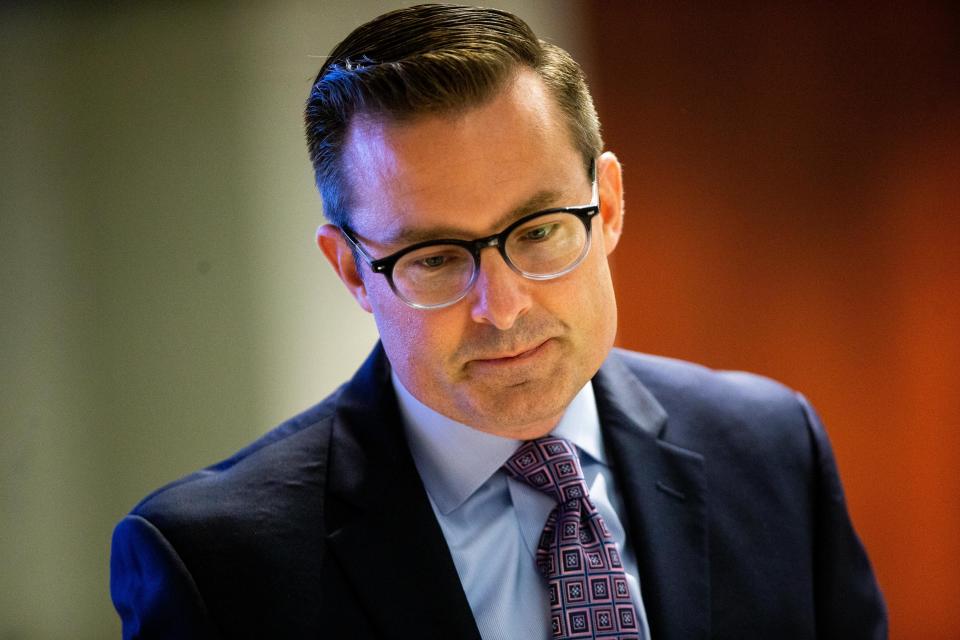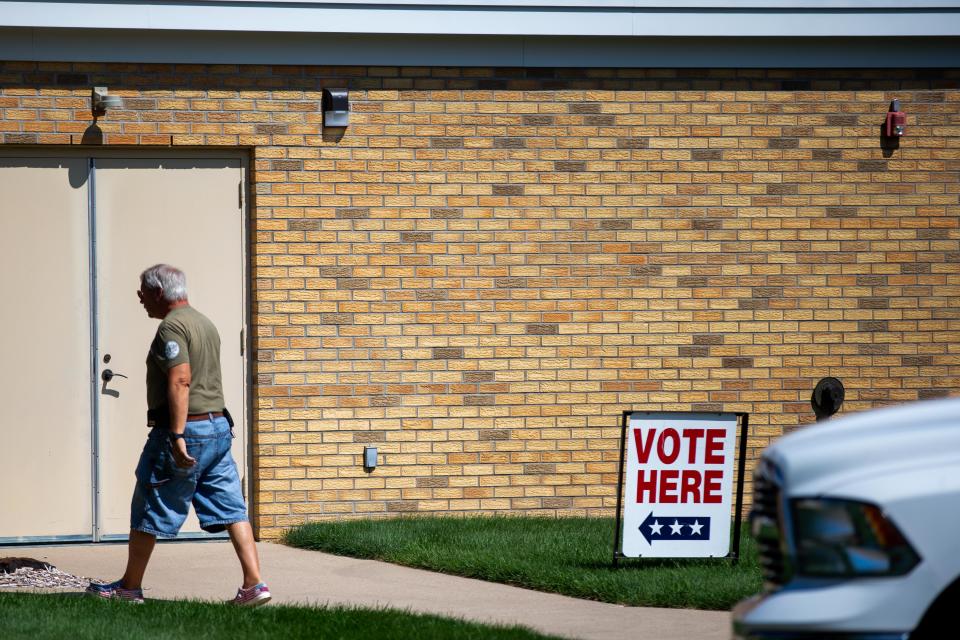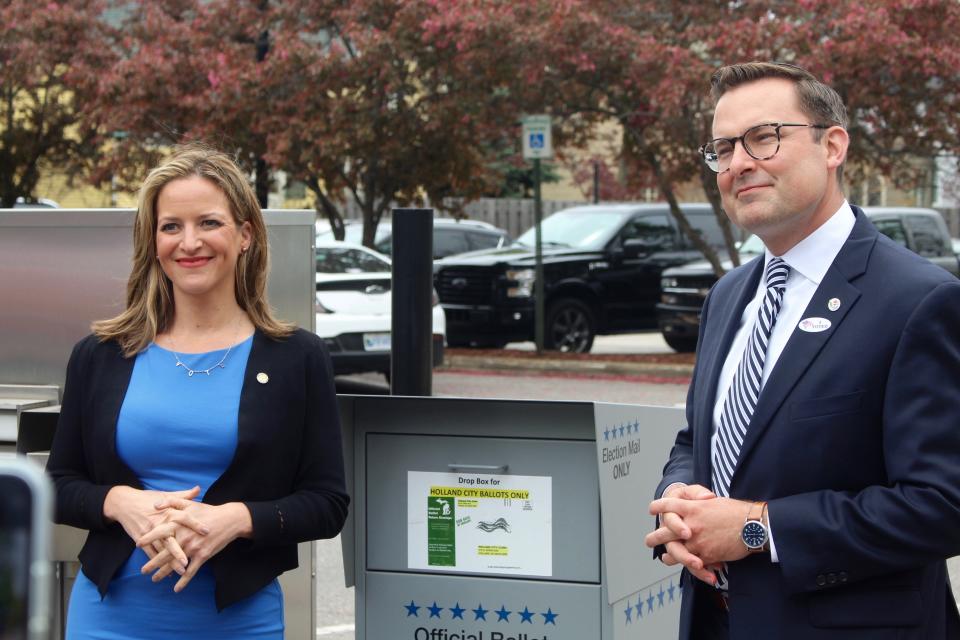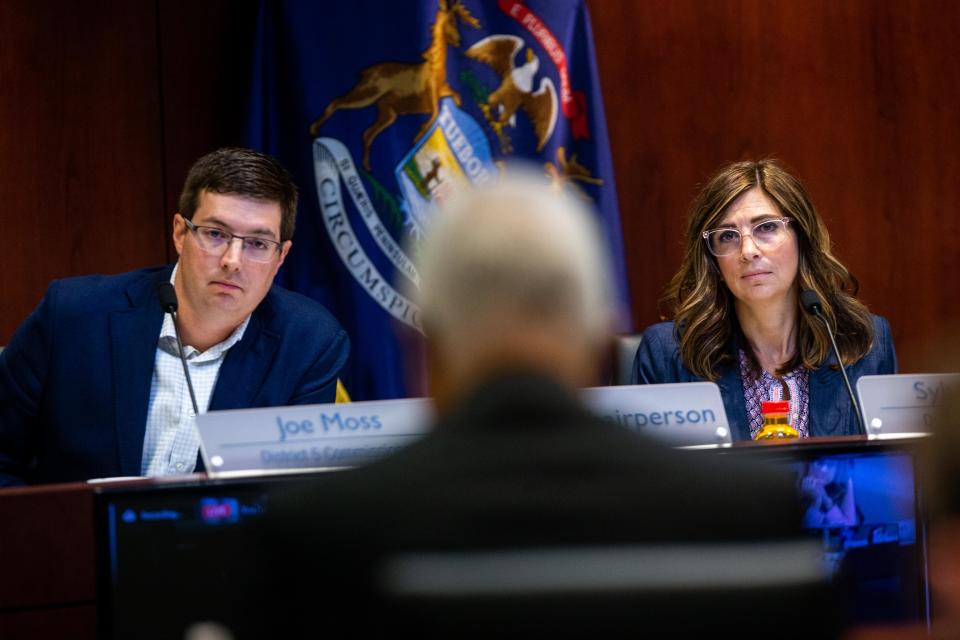Local clerks plead for Ottawa County board to approve early voting plan
OTTAWA COUNTY — Time is running out for Ottawa County to have a coordinated county-wide early voting plan in place to comply with new state law.
County Clerk Justin Roebuck presented an agreement to the finance and administration committee of the Ottawa County Board of Commissioners on Tuesday, Sept. 5. Through it, entities will partner to establish four early voting centers where residents can take advantage of nine days of early voting.

Despite being unanimously approved by the finance committee, board Chair Joe Moss refused to put the agreement on the full board's agenda for Tuesday, Sept. 12. Vice Chair Sylvia Rhodea said she wanted to ensure the process wasn't "rushed," and that she would like to see amendments made before the full board approved the plan.
Seven local clerks gave public comments at the Sept. 12 meeting, saying that by not approving the measure, the board was jeopardizing plans that have been in place for months — and could ultimately cost tens of thousands of dollars in unnecessary costs if individual municipalities are forced to go it alone.
More: Early voting in Ottawa County could be easier than ever in 2024
Port Sheldon Township Clerk Teresa De Graff said she was "puzzled" and "concerned" that the plan was not on Tuesday's agenda for approval.
"I don’t understand your reasoning, but let me share with you how your decision directly affects my township. Contracting with Ottawa County will, conservatively, save my township well over $15,000 in the first year alone," De Graff said. "In addition, without your approval, my township stands to lose out on thousands of dollars of grant money offered by the state. Without the partnership of Ottawa County and other local jurisdictions, I’m not sure how my township will ever be able to find the necessary human resources to go this alone."
Allendale Township Clerk Jody Hansen said she will need to "recrunch" numbers and ask her municipality for more money.
"I was a little discouraged to see that the early voting and the election asks were removed from today’s agenda. As a matter of fact, I had a small panic attack," Hansen said.
De Graff implored the board to approve the plan. If it isn't approved by the board's next meeting on Sept. 26, it would give local municipalities only five days to put backup plans in place.
"By delaying approval, you are making it nearly impossible for the locals to work out arrangements with municipalities, given the time constraints of the new legislation," De Graff said. "To put it bluntly, the success of the 2024 election cycle depends heavily on this early voting plan. Please know that. Please. ... I literally almost cried when I heard you guys pulled this, OK? I don’t know how I’m going to do it without your approval. Please."

What is early voting?
In November 2022, the voters of Michigan overwhelmingly passed Proposal 2, a constitutional amendment that, among other things, provides the right to vote early before each statewide and federal election for at least nine consecutive days, beginning on the second Saturday before the election and ending on the Sunday before the election, for at least eight hours each day.
The first election in which early voting is constitutionally required will be the 2024 presidential preference primary, but communities have been encouraged to pilot early voting in 2023.
At early voting centers, voters will be able to complete their ballot and insert it into a tabulator just as they would at their Election Day polling site. "Early voting sites" can be set up to serve voters from more than one city or township, which is reflected in the Ottawa plan.
The proposed plan for Ottawa County would put $769,094 toward an early voting plan over the next two years to fund four early voting centers throughout the county. The financial agreement would require the county to put $309,625 into the plan, while the county's 23 local municipalities would contribute a combined $459,469.
The decision to implement a singular, county-wide system would help all the municipalities save money, Roebuck said.
"We estimate conservatively we'll save well over a half million dollars in just this first year in this first election cycle versus doing it individually," Roebuck told WZZM-13 last week. "So, by doing it collectively as the entire, you know, one system for the entire county, we'll save over a half million dollars than if each jurisdiction, each city and township were to do it on their own."

Why is a county plan needed?
Holland Township Clerk Michael Dalman said the countywide plan was the result of collaboration between several local jurisdictions and the Ottawa County office of strategic planning.
He said the team considered many options for holding early voting and determined that the four planned early voting centers and the associated costs, along with oversight from the local clerks, was the best way to meet voter needs.
"We are presenting a plan that saves our taxpayers many dollars and presents one, uniform message to all of our voters about early voting in Ottawa County," Dalman said Tuesday.
The handful of centralized locations would be open to anyone in the county, meaning voters can choose to use whichever one is most convenient for them. Roebuck suggested centers in Holland, Grand Haven, Georgetown Township and Crockery Township.
District 3 Commissioner Doug Zylstra said it's important for residents to understand that, of the $309,000 that the county would contribute, the state would reimburse $202,000, "leaving a total net county investment of just under $100,000."
"The net county investment of $100K will help create savings of approximately $600,000 for taxpayers at the local level," Zylstra said in a Sept. 14 social media post. "So, far from being ‘a massive burden of hundreds of thousands of dollars,’ our involvement is a relatively small investment of $100K to help save 6x that countywide at the local level."
Prior to the finance committee vote, 19 of 23 local units had approved the agreement, with the others expected to follow, Roebuck said. The plan includes creating two new county positions, one full-time and one temporary.
He said the county partnering with municipalities, rather than each of them running their own early voting center, will save money. He told the board the plan could save an estimated $600,000 in the first year.
The cost for cities, villages and townships is determined by registered voters. Each municipality will pay a percentage of the cost equal to the percentage of registered voters in their region.
The county’s costs would cover equipment, 50 percent of ongoing maintenance and 75 percent of the full-time position in the second year of the agreement. Local units will pay for materials, the other half of maintenance, 100 percent of the salaries in year one and 25 percent of the salary for the full-time position in the second year.
Based on the agreement, early voting will run for nine consecutive days from the second Saturday before a state or federal election through the Sunday before that election. Each site will be open 7 a.m.-3 p.m. with the exception of Tuesday and Thursday, when the sites will be open 11 a.m.-7 p.m.
Hudsonville city Clerk Jill Gruppen said by sharing in the costs countywide, there is a comprehensive, organized plan that benefits all residents.
"Since Michigan elections are administered by local clerks, the expenses of non-special elections are borne by each municipality," she explained Tuesday to the board. "Even when resources are allocated at the most basic level, a single election, with a single day of in-person voting, incurs a significant cost to taxpayers. For example, payroll alone for a Hudsonville election is over $4,000. Now add nine more days, plus other expenses like electricity and heat. If I can alleviate these costs in any way, I want to take that opportunity."

Why is it delayed?
In response to former President Donald Trump's false claims of widespread fraud in the 2020 election, Republicans at the state and local levels have focused on absentee ballot security. Moss and Rhodea lead the board's Ottawa Impact majority, a group of far-right fundamentalists disgruntled over school mask mandates during the COVID-19 pandemic.
At the Sept. 5 finance meeting, Moss attempted to amend the early voting plan agreement to give county commissioners final approval of where the centers would be. Roebuck said, according to state statute, only the county's election commission can approve locations. Moss then withdrew the motion.
After the exchange, Holland Township resident and former board candidate Joe Spaulding posted photos to X, the social media platform formerly known as Twitter, showing what appeared to be a text message exchange between corporation counsel and one of the commissioners. Spaulding was sitting in the gallery during the meeting.
Spaulding's photos appear to show messages between attorney Jack Jordan and another party, visible only as “commissioner."
Joe Moss just tried to give the county veto power over state election law, which is not legal, and Justin Roebuck the county clerk explained the election commission isn't going to help him break state law.
The county attorney played on his phone the entire time.#OttawaCBoC pic.twitter.com/ogHfY4UrlO— Joe F Spaulding 🦉 (@beyond_process) September 5, 2023
The other party, who Spaulding claims to be Moss, sent texts saying: “So it’s illegal for the BOC to approve vote locations?” Then: “I would like to know before this gets to the next board meeting” and “I don’t think the board should give up oversight for locations to the clerk.”
Spaulding also posted images of Jordan apparently searching for local election regulations on his laptop.
At the full board meeting this week, Moss said he put the early voting plan agreement on the agenda as a "discussion" item because "it is this board's job to do the work of the people and ask the tough questions."
Rhodea agreed, saying, "if something isn't quite right about an election, the clerks take a lot of heat."
Grand Haven city Clerk Maria Boersma told the commissioners that nearly all local city councils and township boards have approved the agreement, and that "county commissions do not have any constitutional or legal authority over the administration of elections in the state of Michigan."
"By potentially amending this agreement to include more county commission oversight, it is taking away the authority and input on election administration that is constitutionally given to the local clerks," Boersma said. "The Grand Haven City Council approved this agreement because they trust my nearly 10 years of election experience. ... They did not agree to relinquish our control over elections to the county board of commissioners. The same goes for the other 22 clerks and their local governing bodies."
Moss said his concerns largely centered around the monitoring of ballot drop boxes and his desire to use watermarked ballots, which would deter counterfeit ballots. There is no evidence of any voting irregularities in recent election cycles.
Since Michigan voters adopted a constitutional amendment in 2018 giving every voter in the state the right to cast an absentee ballot, many municipalities have set up drop boxes to receive those ballots and provided prepaid postage for return envelopes.
But Proposal 2 requires at least one state-funded drop box in every municipality, with additional boxes for every 15,000 voters. Detroit, for instance, is home to more than 500,000 voters, meaning the city would have more than 30 drop boxes under the proposal. It also requires state funding for prepaid postage for applications to request an absentee ballot and envelopes to return ballots.
Curran: What are the changes you would like to make before moving forward?
Moss: All locations use watermark ballots.
Zylstra: What is the point of the additional cost?— Sarah Leach ☮️ (@SentinelLeach) September 12, 2023
Roebuck said he was open to purchasing watermarked ballots and that there are state rules surrounding the monitoring of drop boxes, but stressed to the commissioners that the financial agreement before them didn't address any of those issues and merely puts the financial piece of the plan in place between the county and individual municipalities.
He also noted that monitoring of drop boxes would be under the control of local clerks.
Subscribe: Receive unlimited digital access to your local news coverage
De Graaf said the board needs to move the plan forward to ensure the high standards for which Ottawa County is known.
"Like it or not, early voting is now part of the state Constitution, and I need to uphold my oath and implement early voting to the highest standard available," she said. "That standard is in partnership with Ottawa County and other local clerks. ... It’s the integrity of clerks who define the process, not the process that defines clerks. We are the gold standard."
— Sarah Leach is executive editor for The Holland Sentinel. Contact her at sarah.leach@hollandsentinel.com. Follow her on Twitter @SentinelLeach.
This article originally appeared on The Holland Sentinel: What's at stake if OI-led county board doesn't approve early voting plan

